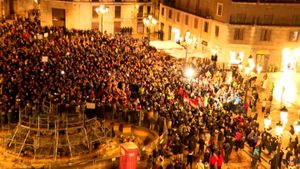Every year, Orthodox Christians commemorate the Mясопустная родительская суббота, or Universal Parental Saturday, which this year falls on February 22, 2025. This sacred day is devoted to the remembrance of deceased relatives and friends, marked by solemn rituals and heartfelt prayers for their eternal peace.
Originated from ancient Christian customs, the observance of this day emphasizes communal prayer, reflective contemplation, and ethical behavior. Religious practices include gathering at churches to participate in requiem masses, where priests read special liturgical prayers, remembering all departed believers, irrespective of whether they knew them personally. This universal observance is distinct as it seeks to honor every deceased Orthodox Christian, rather than just close family members. Specifically, Mясопустная is celebrated before the Great Lent—a solemn preparatory period when the faithful abstain from meat.
According to religious tradition, the name 'Mясопустная' literally translates to 'meat-pus',' referring to the last weekend when meat consumption is permitted before the onset of fasting. Father Andrei Posternak, dean of the Historical and Philological Faculty of PSTGU, explains, 'The day addresses themes of resurrection and judgment, reflecting our collective accountability before God.' This alignment with the ecclesiastical calendar is not merely ceremonial, but creates the opportunity for many to engage spiritually with the medium of remembrance.
On this day, congregants light candles and offer prayers, often bringing memorial foods to church. It's customary to prepare dishes favored by deceased relatives, as it's believed such acts kindle the spirits' joys. 'Each year, this Saturday invites us to express love and honor toward our loved ones who have departed,' notes priest Anatoly Kulish. 'At its heart, this is about maintaining ties with those who have passed, remembering their lives with gratitude.'
Adherents of the tradition perceive this day as structured by both memorial acts and moral imperatives. On Mясопустная, individuals are encouraged to refrain from quarrels, gossip, and excesses. Speaking about the observance's guidelines, the faithful understand 'that it’s meant to cultivate kindness, serenity, and good deeds.' Engaging in charitable acts, including helping the needy or offering to the church, reflects the day’s ethos.
While visiting cemeteries to pay respects is encouraged, noisy festivities are expressly forbidden, reflecting the atmosphere of solemnity surrounding the observance. Activities resembling traditional feasts are rejected, as such behaviors are reminiscent of pagan roots and detract from the focus on prayer and reflection. Notably absent from the day’s rituals are stark displays of merriment or entertainment; it’s solely dedicated to remembrances and prayers.
Father Posternak elaborates, 'During the Divine Liturgy preceding this day, the Gospel passage will revolve around the Last Judgment, reiterative of the need for grace.' This prepares the faithful for the fasting period, emphasizing the significance of offering prayers for the deceased as intercessions upon entering the Lenten season—an opportunity for soul-cleansing and reconciliation.
Celebrated piloting rites have evolved over time, with folk traditions intertwining with the religious observance. For example, the making of blinis, symbolic of festivity, is adopted more as gifts for the memory of the dead—shared with those needing assistance. Folktales often refer to this day as 'little Maslenitsa' due to these culinary traditions.
With visual symbols associated with Mясопустная prominently propagandized, the remembrance practices include personal rituals—offering written prayers, lighting candles, and visiting graves. The significance of sharing personal stories and memories surrounding family dinners is accentuated as much as prayers. People are also advised to allow the day to serve as introspection, reflecting on one's moral integrity and familial connections.
Looking forward on the Orthodox calendar, other parental Saturdays continue to provide opportunities for solemn remembrance. Great Lent will be followed by specific memorial days, each contributing to the overarching theme of reflection on the faith of the departed. 'With every gathering on these parental Saturdays, we reinforce the affirmation of life and eternity,' concludes Kulish. 'Mясопустная is merely the first, but not the only opportunity to bridge our lives with theirs across the veil of death.'



